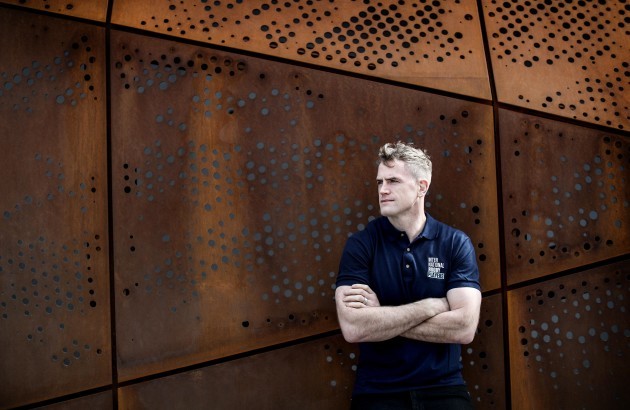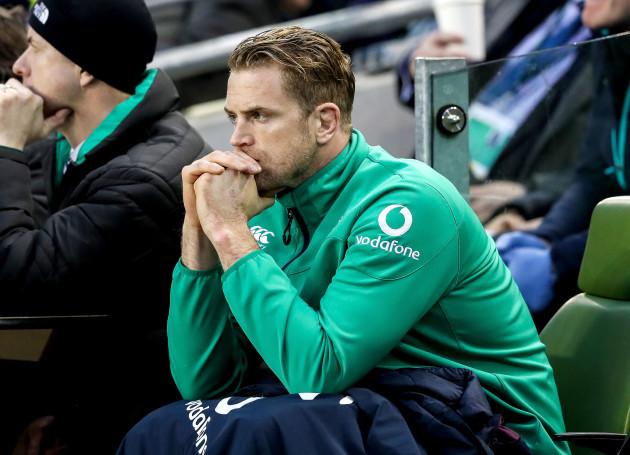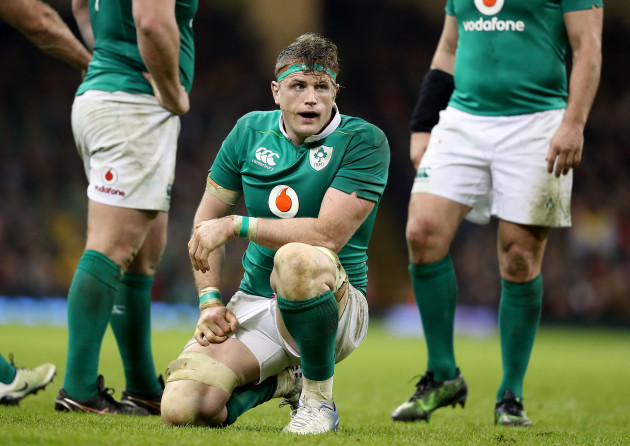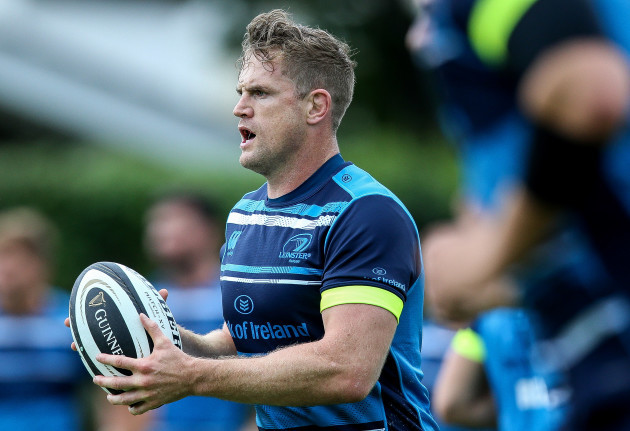WHEN JAMIE HEASLIP first started out in professional rugby, the players’ associations were a very different beast.
“All they were interested in was getting you a discount in Eden Park!” explains the recently retired former Leinster and Ireland number eight.
“That was it. I think you could get a discount on custom-made golf clubs too.”
The landscape has changed completely, with the various players’ bodies now working on issues such as training loads, agent accreditation and the transition from playing into life post-rugby.
International Rugby Players [IRP], who announced their move to Dublin yesterday, have been working increasingly closely with World Rugby to ensure that professional players are being taken care of and, most importantly, heard.
The people who take to the pitch every weekend are, after all, the key actors in the professional game.
Over the past year, with injury keeping him out of playing action and eventually forcing his retirement, Heaslip has been sitting on various Rugby Athletes’ Commissions – essentially, meetings with World Rugby – on behalf of IRP and it’s fair to say he is suited to the role.
Heaslip has achieved as a player at the very highest level of the game, has a love for the business of sport and is a considered speaker.
He’s also well able to think outside of the box and that becomes apparent again when he stresses that the issue of privacy around players’ medical data is one of the most important conundrums for IRP right now.
As was made obvious again over the last year or so, Heaslip has been protective of his injury information during his career and he believes other players need more awareness of their rights in this regard.
“I think data in general, not just medical data, you only have to look at Facebook in the last two days – across the board, I think people are unaware of how important it is for them to control their data and what protocols and policies third parties have in place,” said Heaslip yesterday.
“You’ve got to remember that it’s a team game and we all love this sport. But if you’re in your office and you have a doctor, you have a problem and go and talk to him. That’s your relationship, that is not for anyone else to know.
“Granted, I understand we are in a public forum and you’ve got to feed the beast a little bit. I understand that but at the same time, you have to know where the line is. Sometimes players don’t know where the lines are and that’s why things like International Rugby Players and our players’ association locally are important.
“Your medical data is up to you and your doctor. Policies have to be put in place and they’re trying to put policies in place. At some stage, you do need to let people know about certain injuries.
“Take concussion for example, I’m not saying hide anything, I’m saying people have to know what their rights are because it’s still a workplace.”
Heaslip says IRP have been working with rugby’s governing bodies and clubs towards setting up policies around injury and medical data privacy, though he stresses that it is evolving and “I’m not saying I’m right, we will meet somewhere in the middle.”
He flags the General Data Protection Regulation – “that’s scaring the life out of everyone and so it should” – as proof of how this area of life in general is changing at present.
Heaslip has had very recent experience of the frustration of an injury being publicly discussed and he says that parts of the discussion were lies.
“I think Chinese Whispers came into play post-my injury a year ago. All sorts of things were said about me and some of them were blatant lies and said in public forums.
“There were some pretty hurtful things and some people had no problem getting on the radio and saying certain things when they were not informed at all,” continued Heaslip.
“The only people who knew what was wrong were me and my surgeon and the team doctor. When you’re in the public forum, unfortunately, that’s the gig.
“I didn’t tell anyone what was wrong with me and that’s why I made a conscious choice – ‘this is my information and nobody else’s’. It’s up to each individual player but they’ve got to know what their rights are.
“It can be important when you’re changing clubs, for example. Take an injury and it gets thrown out into the public forum and people are guessing what it is and then a club reads this, then they already have their presumptions on a player’s injury profile without actually knowing the player at all. That can be a bit of a murky area.”
It’s a fascinating topic and just one of the issues IRP are working towards finding common ground in and educating their members on.
Workload and training load is perhaps the association’s greatest concern at present, however, and they will have welcomed the debate around the relative player management of Ireland and England’s players before and since last weekend’s Six Nations game.
Heaslip has first-hand experience of the benefits of the IRFU’s player welfare system, of course, and he is adamant that it is the way forward.
“I don’t think you can underestimate the system we have in place here versus the system that is in other countries, just the way the business model is set up here,” said Heaslip.
“It’s all geared towards the national side and it means the clubs are owned by the national side so they can control how many minutes the player trains, and what’s actually even more important is that they control the training load of the player.
“All that data is centralised, they’re able to monitor it very easily and seamlessly, and it plays a massive role in injury prevention but also freshness. The training load is a big window that I don’t think people realise because you’re obviously training more than you play.
“Having been in the system for as long as I have and seen it change over that time, I think it’s a big edge that Ireland have and nations that have that model have.”
Heaslip does point out that the player management system places great stress on the provinces’ squad depth, but he simply feels that is another strength – there are always young players being pushed and pulled through into senior team action.
Agent accreditation is another big area for IRP, with soon-to-retire All Blacks legend and qualified lawyer Conrad Smith having come on board to help the organisation to bring about better control here.
Heaslip works with IKON’s Damien O’Donohoe and cites him as an important influence on his career, but he says IRP needs to help less fortunate players – including youngsters from the Pacific Islands – to avoid being exploited.
“Just look at soccer, I think anyone can be an agent in soccer and it’s a bit like the Wild West,” said Heaslip. “Lads are saying they’re representing someone when they’re not.
“I think you do it like the NFL do, you accredit it all and you make sure people have to take responsibility, jump through a couple of hoops to be an agent and know what they’re about, what that entails – not just looking at the financial game of it.
“Rugby’s been blessed in some ways because we’ve been late to the professional game, we can see other professional sports and learn from them.
“I think it’s a really good, smart move. It just legitimises something that could cause problems and makes everything more manageable.”
Heaslip is enthused by the work being done by IRP and the projects ahead, and though he acknowledges that rugby is changing rapidly, he is certain that it won’t lose the things that make it special.
“The game will change, that’s just natural. But there are certain values of the game that will always be true.
“If you have the core values of rugby, they’re not going to change but the branches might. That’s very Leo Cullen of me!”
The42 is on Instagram! Tap the button below on your phone to follow us!




